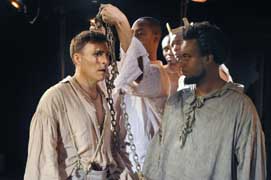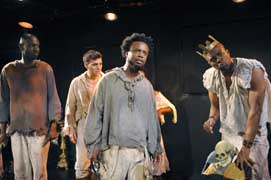
Paulanne Simmons
"Benito Cereno" Is a Stage-worthy Tale of the Sea
"Benito Cereno"
Directed by Woodie King Jr.
Presented by Horizon Theatre Rep
Flea Theatre
41 White Street
Opened Sept. 22, 2011
Thursday thru Saturday at 9pm, Sunday at 7pm
Tickets: $18 (212) 352-3101
Reviewed by Paulanne Simmons Sept. 24, 2011.
 |
Rafael De Mussa and James Jorsling. Photo by Stephanie Berge. |
First produced in 1965, when it won an Obie Award as port of the Robert Lowell trilogy "The Old Glory," Benito Cereno has not beenseen in New York since a 1976 revival. This is a shame, because Lowell’s play, based on Herman Melville’s 1855 novella, is suspenseful and horrifying. Given the ambiguous nature of its source, the play also offers a thoughtful audience various interpretations.
Horizon Rep’s production at The Flea Theater, capably directed by Woodie King, Jr., has enthusiastically jumped into both the horror and the ambiguity of the play. The result is a gripping tale that should keep audiences on the edge of the seat.
"Benito Cereno" is about a slave rebellion onboard a Spanish merchant ship in 1789. Although at first critics viewed the novella as an exploration of human depravity, in modern times it has been seen as both pro- and anti-slavery. Whichever view one takes, the question remains: who is depraved, the slavers or those who have revolted against them?
As the play opens Captain Amasa Delano (Arthur Bartow) and his bosun, John Perkins (Benjamin Thys) are onboard the President Adams, at anchor off the coast of Trinidad. Delano is a cosmopolitan Yankee who has made peace with the hypocrisy of the world. He takes a benevolent attitude towards those beneath him, which includes everyone who has not had the privilege of being born in New England. Perkins is young and idealistic, but always obedient and respectful.
In the middle of a pleasant but character-revealing conversation, the two men notice the San Domingo, a ship with a battered forecastle and rotten head-boards. What’s more, it seems to be manned by slaves.
 |
| Uchenna Onyla, Rafael De Mussa, James Jorsling, Frank Mayers. Photo by Stephanie Berge. |
Delano and Perkins decide to board the ship to find out what’s going on. When they arrive they are immediately struck by the dismal conditions they encounter. Even though it is a Spanish ship (which already indicates inferiority), Delano is still surprised that any captain and crew could have let such an outrage happen. When he finally meets Captain Benito Cereno (Rafael De Mussa) and his faithful servant, the African Babu (Jaymes Jorsling), the sad story they relate of bad weather, disease and death seems to explain everything. The captain resolves to act benevolently, bringing food and supplies to the ship.
However, soon the fact that not a single white man has survived, save one incoherent Spaniard, and the weird entertainment the natives present to Delano and Perkins again arouse suspicion. True to Melville’s novella, King mines all the spine-tingling drama inherent in the story. The natives appear and disappear along the back and side walls of the stage. The sound of the sea is ever-present,Bartow is quite convincing as the well-meaning, naive and casually racist Delano. Jorsling is always menacing, whether he grovels subserviently or openly defies his one-time master. He brings so much energy to the stage his eruption always seems imminent.
"Benito Cereno," despite its flowery language, is very much a modern psychological drama. It’s filled with suspense and foreboding. Like a slow, steady ship in the night, it makes it’s way relentlessly to it’s very satisfying conclusion.

| museums | NYTW mail | recordings | coupons | publications | classified |